|
|
|
Sort Order |
|
|
|
Items / Page
|
|
|
|
|
|
|
| Srl | Item |
| 1 |
ID:
186897
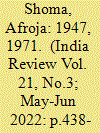

|
|
|
|
|
| Summary/Abstract |
After 24 years of the partition, the new neighboring country, Bangladesh, was born in 1971 in the Eastern region of India. The division of India and the birth of Bangladesh are, apparently, two unconnected events standing at two different times. However, researchers have found the incidents deeply interlinked. Kabir described partition not as an “event” but as an “ongoing process” while Zamindar termed this catastrophic event “a long partition” as the making of Pakistan and India involves years of social, political, and bureaucratic efforts. One of the main queries of this study is to find how partition is portrayed in Bangladeshi fictions. Do the fictions recognize the Liberation War of Bangladesh as an extension of the partition? In search of answers, the study inspects 12 Bengali novels focusing on partition and the Liberation War. This study is guided by the concept of “long partition” and the “Trauma theory” while it also takes Kabir’s theoretical proposition “Post-amnesia” into account.
|
|
|
|
|
|
|
|
|
|
|
|
|
|
|
|
| 2 |
ID:
110175
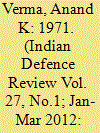

|
|
|
| 3 |
ID:
179458


|
|
|
| 4 |
ID:
187440
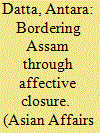

|
|
|
|
|
| Summary/Abstract |
In 1971 when nearly ten million refugees crossed the border between East Pakistan and India following the outbreak of violence in Dacca on 25 March 1971, it would have surprised many to know that nearly fifty years later that date would be the dividing line between India's putative citizens and those it deemed ‘foreigners’. This article takes a look at the immigration debate in Assam, and the protests against the National Register of Citizens and the Citizenship Amendment Act to argue that it is the erasure of 1971 from the latter that gives rise to the backlash against it. I argue that the events of 1971 produces a moment in which both an affective border emerges against the refugees, followed soon after by an effective legal border through citizenship legislation pertinent to Assam. This article investigates the peculiarity of this moment to determine citizenship within India, its consequences and by doing so rewrites the history of 1971 back into debates about citizenship in India.
|
|
|
|
|
|
|
|
|
|
|
|
|
|
|
|
| 5 |
ID:
187209
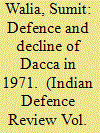

|
|
|
| 6 |
ID:
110333
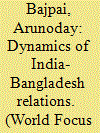

|
|
|
| 7 |
ID:
127216
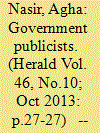

|
|
|
| 8 |
ID:
187129
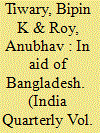

|
|
|
|
|
| Summary/Abstract |
India’s all-out war with Pakistan for the liberation of Bangladesh in 1971 may have been brief, but it came after a lengthy prelude. For months, New Delhi laboured to convince the world—especially the West—about the grim consequences of Islamabad’s oppressive bid to stomp out Bengali nationalism in East Pakistan. While there is adequate literature chronicling the diplomatic persuasion undertaken by India leading up to the war of 1971 and its military pursuits during the conflict, the academic interest in the civil society’s contribution to the cause appears insufficient. A dearth of retrospective case studies of India’s socio-cultural responses to its foreign affairs is, in fact, noticeable, especially in the discourse on Indian soft power. In an attempt to address this gap, by principally relying on the historical evaluative analysis of primary news reports, this article attempts to chronicle the contributions towards the cause of East Pakistan’s liberation by individual and collective civil society actors of Bombay (now Mumbai)—a cultural and commercial hub of India—focusing on the efforts of a dedicated volunteer-run committee for fundraising, the fraternity of the city’s Bollywood celebrities, and a few distinguishable films produced within it. In doing so, the potential of these actors to qualify as resources of India’s soft power during that tense year is also examined.
|
|
|
|
|
|
|
|
|
|
|
|
|
|
|
|
| 9 |
ID:
179022
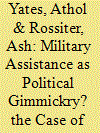

|
|
|
|
|
| Summary/Abstract |
What motivates states to provide others with military assistance? Traditional explanations naturally focus on the security interests of the sender state. But could domestic considerations – intra-party politics, for example – also be a factor in some cases? This analysis, which examines the British decision to send a Military Advisory Team [MAT] to the newly federated United Arab Emirates [UAE] in 1971, answers in the affirmative. It demonstrates that the MAT was primarily, albeit not exclusively, a means by which the British government of Prime Minister Edward Heath could stave off sharp criticism from fellow Conservative politicians that under his leadership that Britain was cutting and running from its overseas responsibilities. Furthermore, because the MAT was in inception a political tool, its military utility in assisting the UAE, or the influence Britain derived from its presence, was minimal at best and counterproductive at worst.
|
|
|
|
|
|
|
|
|
|
|
|
|
|
|
|
| 10 |
ID:
028874


|
|
|
|
|
| Publication |
New Delhi, Hind Pocket Books Private Ltd., 1971.
|
| Description |
23p.pbk
|
|
|
|
|
|
|
|
|
|
|
|
Copies: C:1/I:0,R:0,Q:0
Circulation
| Accession# | Call# | Current Location | Status | Policy | Location |
| 011921 | 954.91/MAN 011921 | Main | On Shelf | General | |
|
|
|
|
| 11 |
ID:
182413


|
|
|
|
|
| Summary/Abstract |
The “cultural turn” in memory studies acknowledges that collective memory has a distinctive social aspect reflected in the manner in which it is communicated orally from one individual or generation to another. However, the point of departure is the emphasis on the need to account for the fact that memory is, in equal measure, shaped and mediated by tangible channels such as texts, images, objects, rituals, buildings and so on. The interactions and intersections between these two strands of approaching collective memory have been employed to write the most human and engaging histories of trauma and displacement – especially in the context of the Holocaust. This article takes this discussion forward by critically looking at the scope of the field of memory studies – with its largely Western frames of reference – to facilitate a deeper understanding of similar engagements and entanglements between communicative and culturally tangible forms of collective memory in South Asia. It looks at the ways in which the dominant discourse of nationalism is constructed and contested through the politics inherent in memorialization and memory in the South Asian context by comparing the partition of 1947 that resulted in the creation of Pakistan and the Liberation War of 1971 which gave birth to Bangladesh. Through a review of some important recent works of scholarship on the long, complex and intertwined afterlife of the partition of the Indian subcontinent in 1947 and the Bangladesh Liberation War of 1971, this article shows how the processes of the construction and contestation of a dominant discourse of nationalism and nationhood are fraught with their own forms of remembrance and forgetting. And yet they speak in a language of exceptionalism that mirrors a somewhat universal template for remembering “difficult pasts” characteristic of the memorial landscape of the Holocaust. Finally, it is argued that the interstices of “national memory” contain voices that unsettle or counter it. Acknowledging these voices while also recognizing their own memory politics shall broaden and nuance the dominant modes of memorializing the partition and the Liberation War in a way that better reflects the specificities and complexities of their context.
|
|
|
|
|
|
|
|
|
|
|
|
|
|
|
|
|
|
|
|
|